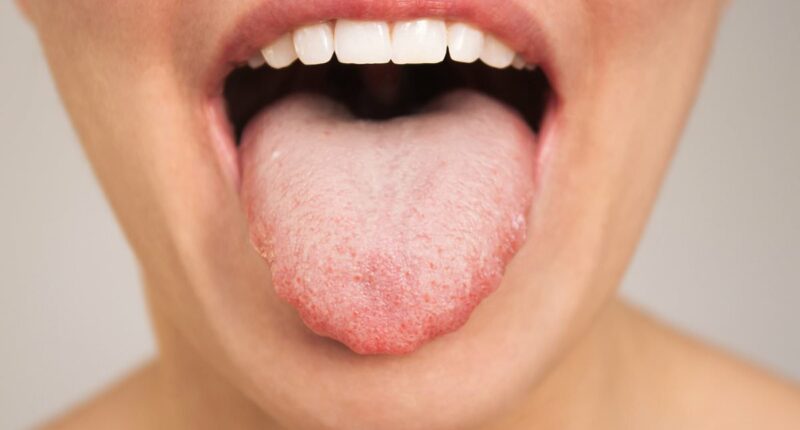Share this @internewscast.com
Feeling a buzzing sensation or a little numbness on your tongue?
Unexplained tingling, known to doctors as paresthesia, is often only temporary and harmless.
But it can, occasionally, be a symptom of an underlying condition.
And while that could be something as simple as a minor allergic reaction, experts warn of far more serious maladies: including strokes.
If your tongue tingles persistently, you should see your dentist or physician.
‘Dentists can further examine the mouth for conditions linked to oral tingling, such as oral thrush,’ Dr Daniel W. Croley, chief dental officer at Delta Dental, told the Daily Mail.
‘When those causes are ruled out, the next step should be visiting your primary care provider to look at other possible systemic conditions.’
Here, the Daily Mail details the six most common conditions that can cause tingling of the tongue.

Unexplained tingling, known to doctors as paresthesia, is often only temporary and harmless. But it can, occasionally, be a symptom of an underlying condition.
Stroke
A stroke occurs when blood flow to the brain is interrupted, either by a blockage or a rupture in a blood vessel.
This can lead to numbness or tingling in the tongue, face or limbs.
Similarly, a transient ischemic attack (TIA), often called a ‘mini-stroke’, can cause a brief blockage of blood flow to the brain, resulting temporary tingling or numbness, sometimes in the tongue.
‘Assuming this sensation did not follow oral surgery or an injury, the first thing I think of and would want to rule out related to tingling of the tongue or mouth is stroke,’ Dr Jandra Korb, dental director for DentaQuest in Oklahoma, told the Daily Mail.
‘Since, a stroke is a medical emergency, the best plan is to call 911 – especially if you also have a droopy face, a bad headache or trouble speaking.’
According to the CDC, about 800,000 Americans experience a stroke each year while nearly 150,000 die from one.
Vitamin deficiencies
Not getting enough B vitamins, especially B12, can also trigger unusual sensations in the mouth.
Research shows that vitamin B12 plays a critical role in maintaining healthy nerve function, and a deficiency can lead to nerve damage resulting in tingling, numbness or other odd sensations.
‘Vitamin B12 is essential for nerve function and red blood cell production,’ Dr Sandip Sachar, a New York-based board-certified dentist, told the Daily Mail.
‘Its deficiency can lead to glossitis [inflamed tongue], burning sensations and tingling. This is usually reversible once the deficiency is identified and corrected.’
Tongue tingling has also been associated with other nutrient deficiencies including B9, Iron and Zinc.
‘Certain over-the-counter medications or vitamin supplements can help resolve the issue over time. It’s important to report any oral tingling to your healthcare provider to determine the underlying issue,’ Dr Croley, of Delta Dental, added
Nerve damage
In addition to vitamin deficiency, conditions such as multiple sclerosis (MS), nerve compression and type 2 diabetes can all also lead to nerve damage, which may sometimes cause tingling in the tongue.
However, according to NYC dentist Dr Sachar, tongue-related nerve damage can also occur in otherwise healthy individuals, particularly during dental procedures or surgeries.
‘In dentistry, one of the more common and direct causes of this is nerve damage,’ she said.
‘For example, the lingual nerve – which provides sensation to the tongue – can sometimes become irritated or injured during dental procedures like wisdom tooth extractions, implant placements, or even with deep local anesthesia injections used for fillings or routine dental procedures.
‘This type of nerve damage can result in tingling, burning or numbness of the tongue.’

A transient ischemic attack, or a mini-stroke, can also cause a temporary blockage of blood flow to the brain and lead temporary tingling or numbness in the tongue
Delta Dental’s Dr Croley explained that the intensity of the tingling can vary from patient to patient, depending on their medical history – ‘there may be residual nerve damage from a previous surgery or procedure.’
Low blood sugar
Hypoglycemia, or low blood sugar, occurs when glucose levels drop below the normal range. It most commonly affects people with type 2 diabetes.

Dr Sandip Sachar, a New York-based board-certified dentist (pictured)
In some cases, individuals with diabetes may experience tingling or unusual sensations on their tongue, a possible warning sign of hypoglycemia.
This usually happens if you skip meals, or take too much insulin or certain medications for diabetes.
‘Oral health and diabetes have a bidirectional relationship in which diabetes symptoms can prompt issues in the mouth such as tingling or numbness and oral health issues such as bleeding gums can make it harder to keep a healthy blood sugar level,’ Dr Korb of DentaQuest explained.
‘It is often not the only symptom, however, as hypoglycemia symptoms usually start with shakiness, sweating and dizziness.’
Allergic reactions
Oral allergy syndrome is a mild form of food allergy to raw fruits and vegetables. Symptoms typically only include localized itching, tingling or swelling.
However, experts warn that reactions can escalate and, in rare cases, lead to anaphylaxis, a potentially life-threatening condition that requires immediate medical attention.
Signs of a severe reaction usually appear shortly after exposure to an allergen and may include wheezing, coughing, difficulty breathing and swelling of the mouth, throat or face.
‘Allergies, whether to certain foods, oral care products like certain toothpastes, or dental materials used during procedures, may also trigger tingling or a pins-and-needles sensation as part of a localized reaction,’ NYC dentist Dr Sachar said.
‘These reactions are usually mild and resolve quickly once the irritant is removed, but persistent symptoms should be evaluated.’

Extreme anxiety or even prolonged stress can also trigger strange physical symptoms in the body including a tingling tongue (Stock Image)
Anxiety and stress
Severe anxiety or prolonged stress can also trigger unusual oral symptoms.
Experts explain that during periods of intense stress or anxiety, the body enters a fight-or-flight response, which can cause blood vessels in the mouth to constrict.
This reduces blood flow which may lead to temporary numbness or tingling.
‘Tingling in the tongue happens when an oral nerve has been altered or triggered, which can be caused by stress, anxiety, allergies, environmental factors,’ Delta Dental’s Dr Croley noted.
The best way to prevent odd sensations in the mouth is by brushing and flossing your teeth regularly, and booking in a twice-yearly visit to the dentist.
‘We often don’t think of routine dental check-ups as total wellness checks, but dentists are looking at much more than your teeth,’ Dr Croley said.
‘They also examine the head and neck area and can detect early signs of chronic conditions ranging from hormonal shifts to cardiovascular disease. If you experience oral tingling between visits, don’t wait until your next routine preventive visit. Contact your provider right away.’











